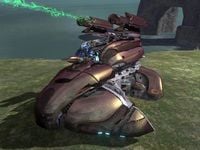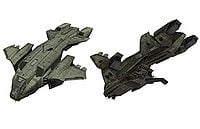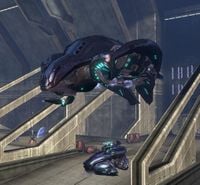Vehicles
From Halopedia, the Halo wiki
- For the full list of vehicles see Category:Vehicles
The Vehicles from the Halo universe, available in campaign and multiplayer gameplay, are a very important part of the game itself. Many different types of vehicles exist and are shown and most are playable in the Halo games, each with a different set of abilities and strengths.
Vehicles have distinct tactical advantages. They can be used to bombard enemy forces or placements, or similarly, to destroy enemy forces and overwhelm infantry. On a different note, they can provide support essential in skirmishes as well as give quick transport while simultaneously allowing the fire of powerful weapons in most cases.
Even though vehicles are powerful, they also have some disadvantages, such as not being able to fit in as tight areas that infantry can, be clearly seen and destroyed by enemy artillery or explosive small-arms fire, and finally, can be hijacked.
Gameplay
In gameplay, only a small number of very unique vehicles are drivable and controllable, most operating in a similar fashion, allowing driving (navigation) and control of mounted weaponry (attack), though some allow one to do both simultaneously or only provide one of the two. Such weapons usually have unlimited ammunition available, whether they are Human (ballistic-based) or Covenant (plasma-based).
When the player enters a vehicle by climbing into driving, weapons or passenger seats, the camera switches from a first-person to a third-person view. This improves peripheral vision and the bird's eye view makes it easier to drive around, with nearby terrain easily fitting into view. When the player has control of weaponry while been driven around in a vehicle, either hand-held weapons (usable while in passenger seats) or mounted weapons (usable while in turret seats), a stylized aiming reticule is displayed much like when in first-person view, locked to the center of the screen and replacing the typical arrow cursor.
The player is allowed to use vehicles from either of the two primary races, Human or Covenant, often turning the Covenant's usually superior firepower against itself. Playable human vehicles are typically grounded, and unable to fly. Almost every playable Covenant vehicle has the capability to overcome gravity to some degree, and hover or even fly around. The majority of spacecraft and aircraft can be seen in cutscenes, though the player cannot control or affect them in any way.
UNSC Vehicles are usually named after African animals that they may resemble (such as the Warthog or Pelican), while Covenant Vehicles are mostly named after supernatural beings (such as the Ghost or Phantom); with the exception of large land units being named after insects (such as the Scarab or Locust).
Allied
UNSC and Covenant Vehicles are made available in campaign levels (depending on which side the player character is on, UNSC/Covenant), when the player needs to infiltrate or cut through enemy-held territory.
Either kept unused, waiting for a driver or allowing the player's character (Master Chief or The Arbiter) to switch with a friendly unit, the player may enter it without meeting any resistance and take control of it. Alternatively the player may enter unoccupied mounted turrets.
Enemy
Yet, since UNSC Vehicles are rarely available within campaign levels, it is a common practice to kill the driver of Covenant Vehicles in order to hijack them. Although it is relatively easy to kill its driver from afar with careful sniping, the preferred approach is known as "boarding", and consists of:
- Jumping onto an enemy vehicle when near its rear or seating area
- Cutting through its defenses by throwing Frag Grenades into or sticking Plasma Grenades onto its armor plating.
- Killing the driver by Melee attacks (available with any player character) or more grenades
- Jumping down from the now disabled vehicle, which automatically grinds to a halt without its driver
- Climbing into its driver seat as usual, since the fallen driver's body would have fallen out of the vehicle
This procedure may also be followed while in Multiplayer gameplay, to take control of UNSC or Covenant vehicles controlled by members of opposing teams. Vehicles that have been stopped by sheer firepower, destroying or disabling them, cannot be taken control of.
In Multiplayer
Certain vehicles can be driven in multiplayer levels. Vehicles can be very useful in Slayer and Skirmish gametypes. In Capture the Flag, once the player character has picked up the flag, the character cannot drive a vehicle or take control of its weaponry though the character may ride in a vehicle driving by another character. Certain maps allow vehicles can be added in by players, before the start of the game.
Types
In the Halo universe five different types of vehicles exist. The first four consisting of ground vehicles: Light, Medium, Heavy and Giant. The last type consists of all Aerial vehicles. Each has different strengths, weaknesses and purposes, which help to ultimately decide which vehicle to use in which situation. Some vehicles are unusable in the Halo games, but can be available for use with the use of modified game content.
Light Vehicles
Light vehicles are usually used to travel for short distances along with fighting infantry units. They are agile and are usually equipped with small weaponry types. They usually carry up to four passengers. Some have light weaponry and armor which means they can be vulnerable to heavy weaponry, or leave the passengers and driver badly exposed to small arms fire.
- Ghost - Recon/Rapid Assault Vehicle - Usable in Halo 1, 2, 3 and Halo Wars.
- Brute Prowler - Light Recon Vehicle - Usable in Halo 3.
- Brute Chopper - Rapid Assault Vehicle - Usable in Halo 3 and Halo Wars.
- Spectre - Light Recon Vehicle - Usable in Halo 2.
- M274 Mongoose ULATV - Ultra Light Recon Vehicle - Usable in Halo 3
- M12 Warthog LRV - Light Recon Vehicle - Usable in Halo 1, 2, 3, and Halo Wars
- M12A1 Warthog LAAV - Light Anti Armor Vehicle - Usable in Halo 1 (PC)
- M12G1 Warthog LAAV - Light Anti Armor Vehicle - Usable in Halo 2, 3, and Halo Wars
- M831 TT - Light Troop Transport Vehicle - Usable in Halo 3
Medium Vehicles
Medium vehicles are a midway point between the recon prowess and agility of the light vehicles and the hard hitting power of heavy vehicles, without matching tanks in fire power. Medium vehicles will usually take more damage before destruction, and will provide better defense for the driver and passengers. They are usually larger than light vehicles, and will often carry heavy support weaponry.
- Covenant
- Shadow - Armored Personnel Carrier - Unusable, Turret Usable (Halo 2)
- UNSC
- Wolverine - Self Propelled Anti Aircraft Artillery - Usable in Halo Wars.
- Cobra - Anti-Vehicle/Fortification Artillery - Usable in Halo Wars.
Heavy Vehicles

Heavy vehicles are designed to smash foes to pieces and crush the enemy beneath their treads. They usually feature powerful weapons and heavy armor for destroying enemy vehicles and protecting themselves from retribution. They are often slow and are often restricted by terrain.
- Covenant
- Wraith - Self Propelled Artillery - Usable in Halo 2,3 and Halo Wars
- AA Wraith - Anti-Air version of the Wraith - Usable through a glitch in Halo 3
- Locust - Anti-building unit- Usable in Halo Wars.
- UNSC
- M808 Scorpion MBT - Main Battle Tank - Usable in Halo 1, 2, 3 and Halo Wars.
- Grizzly - An upgraded version of the Scorpion - Usable in Halo Wars.
- Rhino - Long range plasma tank - Usable in two Halo Wars levels.
Giant Vehicles
The heaviest of vehicles that are designed for functions as big as their sizes. They are however rarely suited for proper combat situations. They will carry defenses, such as defensive gun emplacements and turrets, but will usually be vulnerable in heavy combat circumstances.
- Covenant
- Scarab - Assault Vehicle - Unusable in Halo 2, 3, usable in Halo Wars.
- UNSC
- Elephant - Mobile command post/Search and Recovery/Personnel Transport - Usable in Halo 3 (only on the multiplayer level Sandtrap) and Halo Wars, though in Halo Wars it is a much smaller troop transport version and not the massive vehicle repair variant.
Aerial Vehicles


Aerial vehicles are often designed for ground support purposes, but are equipped to defend themselves from other vehicles. Aerial vehicles usually only have two weapons - an anti-infantry based weapon, and a heavier type of weaponry, usually missile or rocket based. This is due to the vehicle often needing to be light to be air-worthy.
- Covenant
- Banshee - Covenant ground assault aircraft - Usable in Halo 1, 2, 3, and Halo Wars.
- Heretic Banshee - The Heretic version of the Banshee - Usable in Halo 2.
- Spirit - Covenant troop transport/gunship - Appears in Halo 1, and Halo Wars.
- Phantom - Covenant troop transport/gunship - Appears in Halo 2 and 3.
- Seraph - Covenant starfighter - Appears in Halo 2, 3
- Vampire - Covenant atmospheric fighter - Exclusive to Halo Wars
- UNSC
- Hornet - UNSC ground assault aircraft - Usable in Halo 3 and Halo Wars.
- Transport Hornet - a Hornet without missiles and a slower machine gun. Usable in Halo 3 maps Avalanche and Sandbox.
- Pelican - UNSC troop transport aircraft - Usable in Halo Wars, but rideable and flipable through glitches in the Halo Trilogy.
- Longsword - UNSC starfighter ship - Appears in the Halo trilogy and usable in the trilogy by hacking.
- Shortsword - UNSC atmospheric bomber - Usable in Halo Wars.
- Skyhawk - UNSC jumpjet - Only referenced in the Halo novels.
- Sparrowhawk - UNSC VTOL ground attack craft - Usable in Halo Wars.
- Vulture - huge UNSC heavy gunship craft - Usable in Halo Wars.
- Albatross - UNSC heavy transport/mobile command post - Appears crashed in Halo 2 multiplayer map Relic and Halo 3 Map Sandtrap and farries supplies in Halo Wars.
- Pod - Halo Wars unit used for building bases.
List of Vehicles
In Multiplayer, Halo: Combat Evolved
- Blood Gulch = Ghost, Warthog, Scorpion, Banshee (PC/Mac only)
- Danger Canyon = Ghost, Warthog, Scorpion
- Death Island = Scorpion, Warthog, Ghost, Banshee, Shade
- Gephyrophobia = Ghost, Warthog, Scorpion, Shade, Banshee (PC/Mac only)
- Ice Fields = Ghost, Warthog, Scorpion
- Infinity = Ghost, Warthog, Scorpion, Shade, Banshee (PC/Mac only)
- Sidewinder = Warthog, Scorpion, Ghost
- Timberland = Ghost, Warthog, Scorpion
In Multiplayer, Halo 2
- Ascension = Banshee.
- Backwash = Ghost.
- Burial Mounds = Ghost and Warthog.
- Coagulation = Ghost, Warthog, Banshee and Wraith.
- District = Ghost and Warthog
- Headlong = Ghost, Banshee, Warthog and Gauss Warthog.
- Relic = Ghost and Warthog.
- Terminal = Ghost, Warthog and Wraith.
- Turf = Warthog.
- Uplift = Warthog and Wraith.
- Waterworks = Ghost, Warthog, Banshee, Wraith and Scorpion.
- Zanzibar = Ghost, Warthog and Gauss Warthog
In Multiplayer, Halo 3
- High Ground = Mongoose and Ghost.
- Isolation = Mongoose and Ghost.
- Last Resort = Warthog, Mongoose and Ghost.
- Sandtrap = Warthog, Chopper, Mongoose, Banshee and Elephant.
- Snowbound = Ghost, (The Boundless version features a Mongoose instead).
- Valhalla = Mongoose, Wraith, Banshee and Warthog.
- Standoff = Mongoose, and Warthog.
- Ghost Town = Mongoose.
- Avalanche = Mongoose, Warthog, Hornet (Troop Transport type), Scorpion, Ghost, Banshee, Chopper and Wraith.
- Sandbox = Warthog, Chopper and Mongoose.
- Orbital = Mongoose and Ghost.
- Construct = No Vehicles